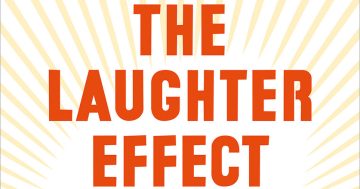Leila Lewis* says being too buttoned up in the office can stifle our creativity and a lack of laughter takes a toll on productivity and relationships in the workplace.
 I have a loud laugh, and I laugh a lot.
I have a loud laugh, and I laugh a lot.
People who like me say my laugh is contagious.
People who don’t tell me it’s obnoxious.
Either way, it’s made me a better professional.
Some time ago, work became the antithesis of fun.
Along with it, laughter became synonymous with wasting time.
We’ll never know if it was the factory supervisors who thought it might slow down the assembly line, or because white collar managers thought those starched, button-up shirts tend to split open from loud belly laughs.
Just kidding.
It is clear, however, that the corporate world desperately suffers from an epidemic of being overly serious.
That makes people miserable, and so it ends up taking a toll on productivity, creativity, and relationships in the workplace.
Laughter is a refreshing respite from the metronome of revenue targets and deadlines.
Laughter doesn’t make you look any less professional — it makes your colleagues enjoy working with you more.
Organisations spend gobs of money on happy hours, off-sites, and team-building activities in the hopes that we’ll output results that ultimately improve the bottom line.
Laughter is a simpler (and cheaper) way to get there.
Laughter can make us more productive and creative
We need to change the perception that laughter and productivity are at odds.
They’re not.
According to a 2009 study, people are more likely to be better at problem solving if they are in a better mood.
Researchers compared their performance after watching a funny video with that after seeing an anxiety-inducing clip.
Unsurprisingly, they “solved more problems with insights” after getting in a laugh or two.
As Drake Braer wrote for Fast Company, managers who successfully cultivate creativity in their teams create a “habitat” for them to do so.
One way they do this is by encouraging humour; this helps employees relax around each other and creates a “playful culture” that lets them bat ideas around without fear of being shot down.
As entrepreneur Peter Sims wrote in his 2011 book Little Bets, “A playful, lighthearted, and humorous environment is especially helpful when ideas are incubating and newly hatched, the phase when they are most vulnerable to being snuffed out or even expressed because of being judged or self-censored.”
Uh-oh. Isn’t humour a liability?
Obviously, not all humour is appropriate.
When representing your organisation, locker room and bathroom humour, political, sexist, malicious, religious, homophobic, and xenophobic humour are big no-nos.
Here are the types of jokes that are generally safe for the office, and the strategic ways that you might want to use them:
Self-deprecating.
This is where you make fun of yourself, and is always a safe choice in the workplace because there is a very low risk of offending others.
After all, it’s you that you’re making fun of.
This kind of humour indicates to others that you’re a good sport about your shortcomings; everyone admires someone who doesn’t take themselves so seriously, and it sets an example that it’s okay for others to make mistakes.
Unexpected.
Sprinkling unexpected responses throughout the day is a quick, non-disruptive way to get a chuckle.
So go ahead, respond to today’s IM conversations Yoda-style.
“Upload to the website, I will.”
Is this necessary?
Absolutely not.
Will your co-workers crack a smile?
Unless they absolutely hate Star Wars, most likely!
Wordplay.
Puns, some of which overlap with dad jokes, are usually groan inducing.
But you can elicit a few laughs if you manage to finesse a clever pun out of industry-specific concepts and buzzwords.
Just test it out on someone else first before you include that in your presentation.
Sarcasm.
This is a tricky one.
Some people’s entire charm rests on their sarcastic prowess, and indeed, quality sarcasm is a beauty to behold.
Studies have shown that there is a positive correlation between sarcasm and intelligence, but as Lydia Dishman pointed out in a previous Fast Company article, too much sarcasm can come off as overly negative, so use this sparingly.
Situational.
Situational humourists are the ones you want to be stuck in a room with during marathon business meetings, power outages, or whatever goat rodeo is happening in conference room C.
Those who have a knack for poking fun at everyday things alleviate the stress of fellow workers overwhelmed by the grind — their commute, work, childcare, housework, bills, taxes.
Everyone wants to work with the person who turns the workday into a Seinfeld episode.
What if you’re just not funny?
Or don’t find other people funny?
That’s okay.
Don’t force it.
But don’t be a spoilsport by frowning at your giggling teammates; instead, laugh with them.
Laughter is the sound of bonding and collaboration, and those are the hallmarks of a productive team.
* Leila Lewis is a corporate communications professional from Austin, Texas.
This article first appeared at www.fastcompany.com.











